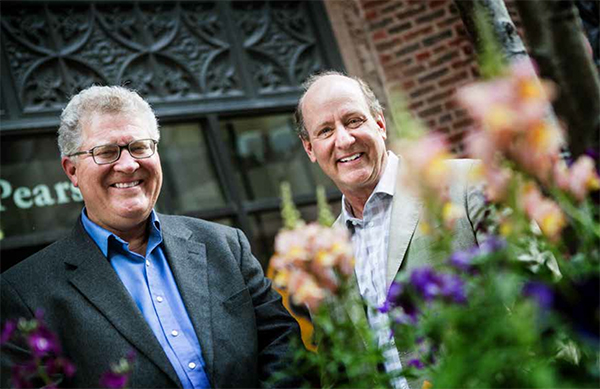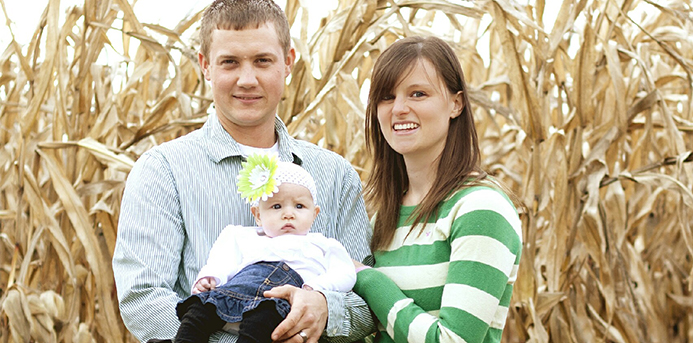Sometimes, investing in the stock market can feel so nebulous — where is your money really going and how is it being used? Dave Miller, a former finance and real estate executive, started seriously pondering those questions about a decade ago after he purchased some farmland in Iroquois County, Illinois. He converted the land to organic, and realized he could support the growth of healthy foods while also making money.
“At that time, a lot of us were fed up with the Wall Street choices and the whole trading scene,” Miller says. “So, I was investing in organic farms.”
As Miller became more involved with the farming community in Iroquois Valley, he learned that there were many farmers who wanted to convert to organic and grow their businesses, but didn’t have the capital to expand. Meanwhile, he knew that many investors were seeking alternative investments that were aligned with their values. So, Miller teamed up with his former Loyola University of Chicago roommate, Dr. Steven Rivard, to launch Iroquois Valley Farms, a food and farmland company that invests in organic agriculture.

“We wanted to put together an investment that people would feel good about, that would be healthy and be something we didn’t have to trade,” Miller says. “That was, we felt, the solution to a lot of the problems with traditional trading products — we wanted something people could hang onto.”
With capital from investors, Iroquois Valley Farms purchases farmland and leases it to organic farmers. Investors get a return through rental payments paid by farmers as well as a variable payment based on farmers’ proceeds from crop sales. Since its launch in 2007, Iroquois Valley has attracted 200 investors, and now has $24 million in assets. They own 27 farms in seven states; farmers produce organic corn, soybeans, grains, dairy and livestock.
Kentucky financial advisor Andy Loving discovered Iroquois Valley when he was looking for non-traditional investment opportunities to diversify his clients’ portfolios. He says farmland traditionally has been considered a good alternative investment to balance market volatility, and Iroquois Valley appeals to socially conscious investors.
It’s not just about supporting the growing of healthy food; Loving says investing in organic agriculture also makes good financial sense. As anyone who’s ever shopped at Whole Foods knows, organic food commands a premium in the marketplace. Loving says a bushel of organic corn or soybeans might sell for two or three times more than conventionally grown crops. While organic farming requires more work and planning, Loving says input costs tend to be lower because organic farmers don’t have to buy expensive genetically modified seeds and fertilizer from companies like Monsanto.
Loving has been so pleased with Iroquois Valley’s performance that he now has 35 of his clients invested in it, and he’s joined the company’s board of directors.
“Over the years, as we go from non-organic conventional farming to organic, the return off of each acre has stepped up every year, creating more variable rent for us,” he says. “We have the base rent of 3.5 percent, and we think over time we an get 8 or 9 percent return between those two rents — and these days 8 or 9 percent return on your money is pretty good.”
Iroquois Valley provides a unique financial opportunity for farmers as well. Andy Ambriole, 27, grew up on his family’s farm in Indiana. In high school, he took an interest in organic farming, and bought a greenhouse to grow organic tomatoes. A few years ago, Ambriole saw a lucrative opportunity to grow his family’s farming business by expanding into organics.
“There aren’t too many other organic farmers in my area, but with price of land, it was cost prohibitive to go out and buy more acres,” Ambriole says. “[Iroquois Valley] was really attractive to me because they were looking for the long-term relationship, as well as being concentrated on organics.”
Ambriole now leases 250 acres from Iroquois Valley, where he grows organic corn, soybeans and wheat. He also produces organic greenhouse tomatoes and goat cheese from his Nubian goat herd.
Ambriole enjoys the hard work of farming, and appreciates the flexibility and not being chained to a desk. He says the partnership with Iroquois Valley has been profitable and has afforded his family the opportunity for his wife to stay home to care for their two young daughters.
“There is a clause as far as profit-sharing — if it reaches a certain threshold, the upside is great for both of us,” Ambriole says of his contract with Iroquois Valley. “They are interested in making the land profitable for the long term.”
Interestingly, 75 percent of Iroquois Valley’s tenant farmers are millenials. Not only does Iroquois Valley share millenials’ preference for organic foods, but the company also gives younger farmers a chance to do something they might not achieve on their own.
“[Farming] is a tough business — a lot of capital is required, and a lot of younger people that don’t have that capital,” Ambriole says. “So, it’s nice to work with partners like Iroquois that share similar values.”
More from Make It Better:

